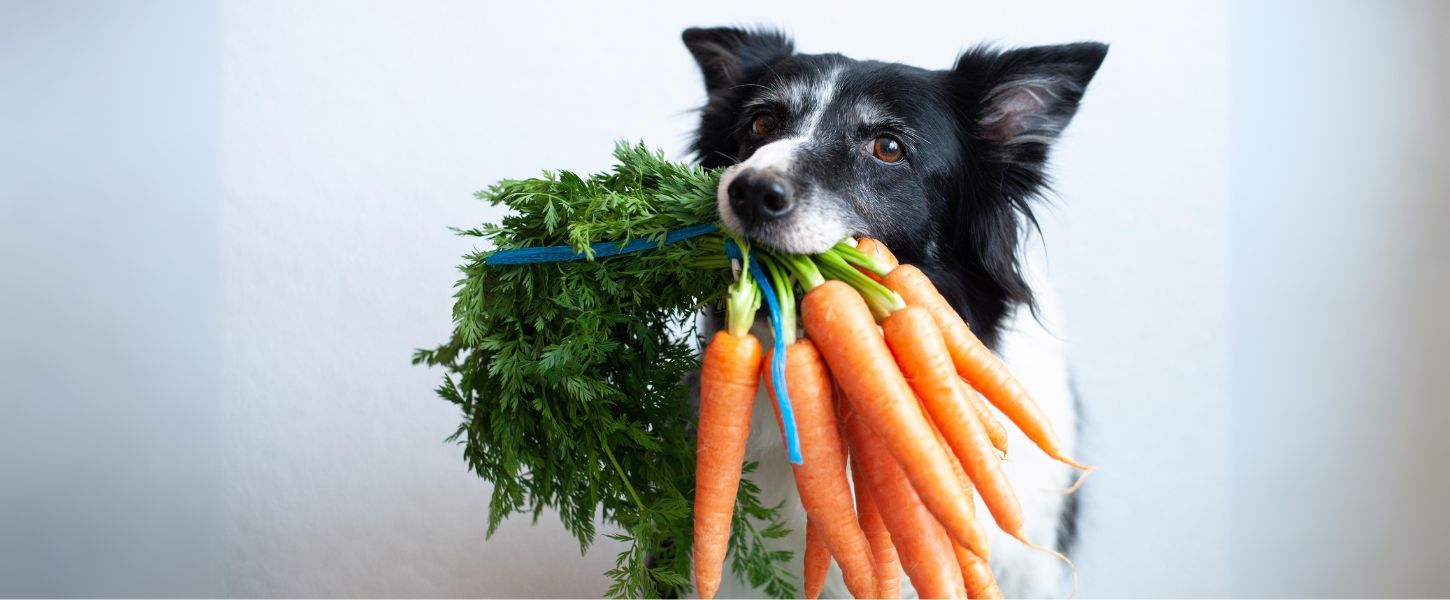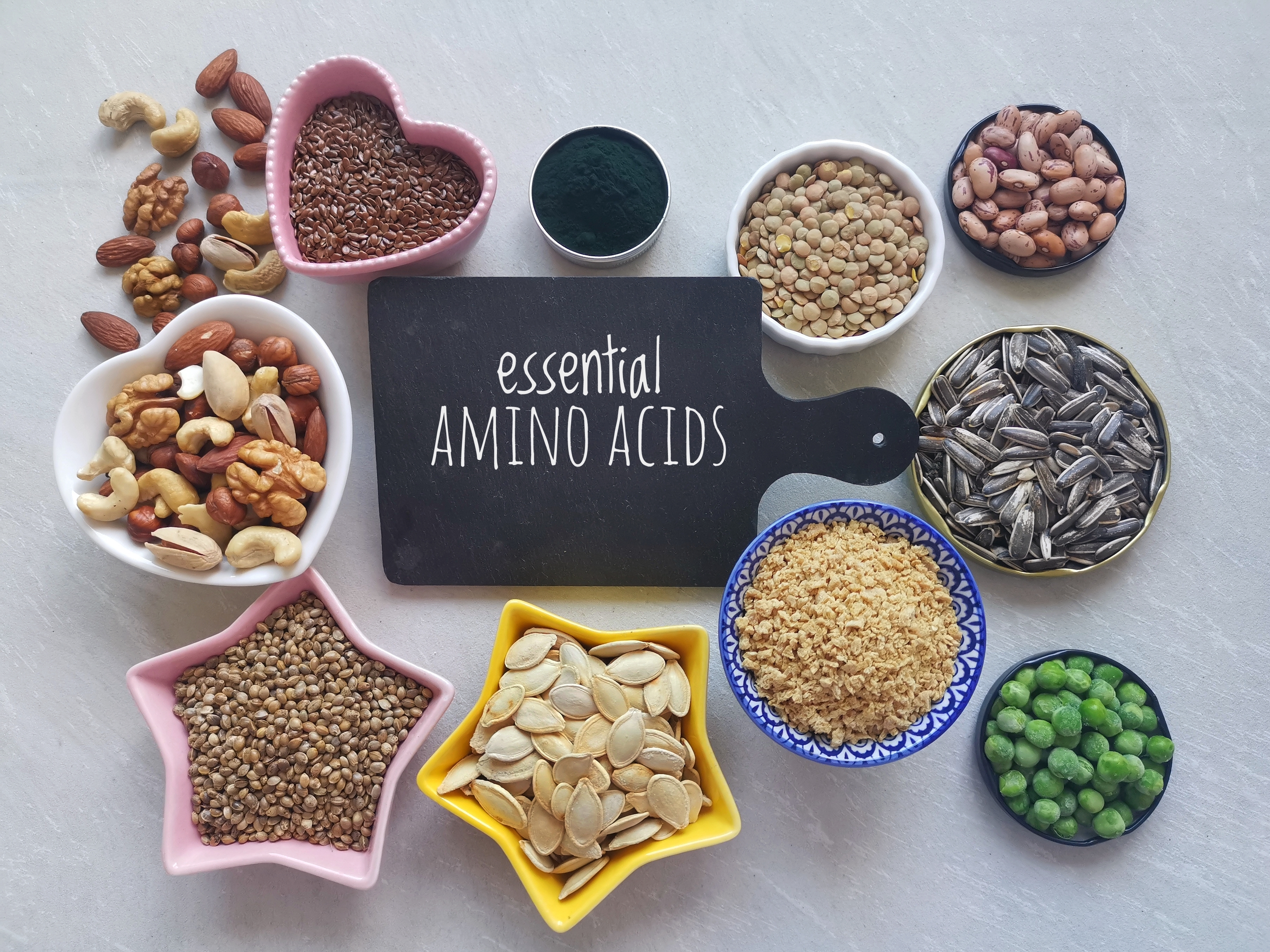Plant Based Nutrition for Dogs: What Every Owner Should Know
October 13, 2023 | By David Jackson
A lot of people in the UK and the rest of the Western world are trying to decrease their meat consumption. Whether it's a question of reducing our environmental impact, animal welfare concerns or simply for health reasons, low or no-meat diets are surging in popularity.
As a pet parent, we're also told that dogs do best on foods that are high in meat (we say it enough on this site!) which raises a quandary: do we do what's best for our dogs or do we do what's best for the planet and wider animal welfare? Well, the producers of the ever-expanding array of plant-based pet foods that are appearing on the market tell us we can do both.
But can a species that has evolved on a diet that has always included a high proportion of meat really thrive on a veggie diet? Dive in with me as we unleash the facts and myths about plant-based chow for our four-legged friends!

Dogs:From Wild Wolves to Bestest Buddies
The story of our loyal companions dates back 10,000 to 30,000 years when they branched off from wolves. Although dogs are part of the Carnivora order (which confusingly includes both meat-lovers like lions and leaf-crunchers like pandas), both wolves and dogs are pretty flexible when it comes to food.
The wolf diet, depending on location and season, can be up to 50% plant-based. They're true omnivores. Dogs, on the other hand, evolved side-by-side with us humans. From the early days of agriculture, dogs have been right beside us, scavenging our leftovers and adapting to a diet richer in starches.
But fast forward to today, and crafting the perfect menu for our four-legged pals is a bit more scientific. Manufacturers of complete dog foods have to ensure that their products provide everything a dog needs (although some do a much better job than others!). With meat as a primary ingredient, the task gets a lot easier. This is because meat is a rich source of numerous valuable nutrients including proteins, fats and vitamins. Trying to achieve the same goal without any animal ingredients? Well, that's a lot trickier.
Nutrient Concerns:
There are a few nutrients that dog foods usually derive predominantly from animal sources - protein of course (including several essential amino acids), omega 3 oils and vitamins like A, B12, and D. The main challenge with any plant-based diet is ensuring it contains enough of these nutrients.
Protein & Amino Acids
Every dog owner knows the importance of protein. It's not just about muscle; it's the fundamental building block for everything from cells and organs to hormones.
All proteins are made from amino acids. Dogs need 22 different amino acids, 10 of which they can't produce in sufficient amounts themselves. These are known as 'essential', and they have to come from their diet. These all-stars include arginine, histidine, isoleucine, leucine, lysine, methionine, phenylalanine, threonine, tryptophan, and valine.

So here's the debate: Can plants provide these amino acids? The short answer is yes, but there's a bit more to it. Plant-based sources do have amino acids, but the levels and profiles can differ from what's found in animal sources. For instance, while many animal-based ingredients are what's called 'complete protein sources' - i.e. they contain all 10 essential AAs in the correct amounts, no single plant protein source does. This means that different plant protein sources must be carefully combined in order to give your dog all of the amino acids he or she needs in the right levels.
Methionine and taurine can be particularly tricky. Both are typically abundant in meat but are much less prominent in plant sources. For this reason, plant-based pet foods often have to top-up their levels, which is why you often see 'taurine' and/or 'methionine' listed in the ingredient lists of plant-based pet foods.
Fatty Acids
Essential oils are, well, essential for good health. Omega 3 oils come in three forms - DHA, EPA and ALA. DHA and EPA (found in fish oils) are generally considered the better options for dogs since they can be used as they are while ALA (found in plant oils) needs to be converted into the other forms by the dog's body before it can be utilised. Algal oil is the big exception as it contains both DHA and ALA so is definitely something to look for when comparing plant-based options.
Vitamins

The vitamin profile of any dog food is crucial. Too little (or sometimes too much) of any one vitamin and health problems are sure to follow. While animal products naturally offer a broad spectrum of easily absorbed vitamins for dogs, getting the balance right with plant sources needs a lot more consideration.
Vitamin A: Predominantly found in animal tissues, it's a cornerstone for vision and immune health. While plant sources like carrots do offer Vitamin A, it's worth noting that the type from animal sources tends to be more readily absorbed by our four-legged friends.
Vitamin B12: Here's a challenge-plants naturally lack this essential vitamin. However, modern diets can incorporate a synthetic variant that, when used correctly, meets our dogs' needs just as efficiently.
Vitamin D: This one's pivotal. Generally sourced from meats, there's an ongoing discussion about the efficacy of the plant-based Vitamin D2 (ergocalciferol) versus the commonly used animal-based D3 for dogs.
Plant based vs Meat based dog food
Meat is, unquestionably, a very good source of nutrition for dogs. It contains several key groups of nutrients in exactly the correct levels to cater to their needs. For that reason, I don't think anyone could currently argue that plants are a nutritionally superior basis for a dog food than meat. That being said, when it is done right, with very careful formulation and ingredient sourcing, it could theoretically be on par.
'Theoretically' - and that's the problem. Studies comparing plant-based and meat-based diets for dogs have been fairly limited so far and until more data emerges on the long-term health implications of plant-based diets, all we can really do is speculate.
One thing I can say for sure, though, is that I would be much happier feeding my dog a good plant-based food than a low-grade meat-based food.
Commercially produced plant-based diets
Commercial diets, especially from reputable brands, come with the assurance of expert formulation and research-backed nutrition. Yet, it's vital to remember that not all commercial foods are made equal. If you're going down the plant-based route, we suggest looking for foods with clear, unambiguous ingredient lists. Look for multiple, named plant protein sources, possibly with additional supplementation of key amino acids (methionine and taurine) and a good source of essential oils (ideally algal oil). You can also provide an additional supplement of these key nutrients to be extra safe. And be sure to contact the manufacturer directly with any doubts you might have.
The Home-Prepared Route

Home-preparing your dog's diet presents a double-edged sword. On one hand, it offers the promise of freshness, personalization, and the ability to handpick ingredients. On the other, there's always the risk of missing out on vital nutrients, leading to deficiencies or imbalances. Without incorporating meat, this risk increases dramatically so, unless you have a lot of experience and expertise in canine nutrition, we would strongly recommend sticking with the commercially prepared plant-based options.
Check in with your vet regularly
No matter the dietary preference, the importance of regular veterinarian consultations cannot be emphasized enough. Particularly for dogs on plant-based regimens, these checks become instrumental in the early detection of any nutrient imbalances or deficiencies. Adjustments to the diet, based on professional guidance, can ensure the dog's health and well-being.
Final thoughts
For the increasing number of people looking to balance their pet's health with wider environmental and animal welfare concerns, plant-based pet foods offer a lot of promise. But while the preliminary research looks encouraging, it also emphasizes the need for further comprehensive studies.
For that reason, it's hard for us to fully endorse plant-based foods for dogs at this stage. Chances are your dog will do just fine on a good, commercially produced plant-based diet but long term, we just don't know for sure yet. So if you are taking the plant-based route with your dog, we'd recommend regular veterinary check ups, if only for peace of mind.
|
MALITAA •2 months ago
Dogs are omnivores and can eat both meat and vegetables/fruits/plants/rice/pasta/lentils/peanut butter etc etc. A dog can't get all of its required nutrition eating just raw meat no matter what the dead animal is. On the other hand a dog can absolutely survive and thrive from a plant based diet. All protein on earth and most vitamins come from the earth and plants...a dead carcass is just the middle man that has already used the best nutrients. Brambles the longest living dog lived 25+ years on a vegetarian diet. I'm feeding my dog nutrition that will make it live as long as possible and not what I or any other human likes to eat.Weena •one year ago
Dogs are omnivores and have canine teeth to prove it. I'm guessing that given the choice between meat and veg dinner v plant only dinner a dog would choose meat and veg every time. If a person decides they want to be vegetarian that's their choice but dogs rely on us for their dinner and its not fair to force them to eat an unnatural (to them) diet.